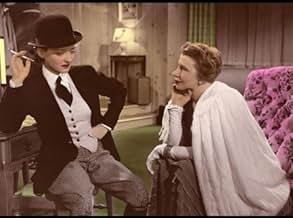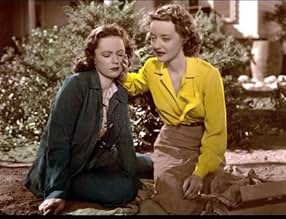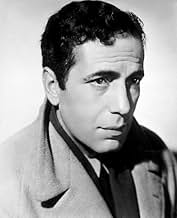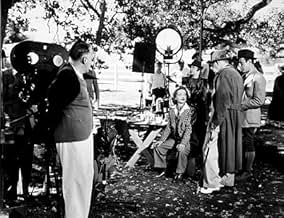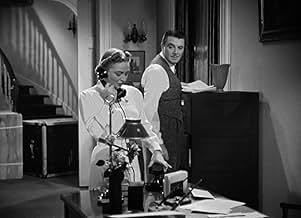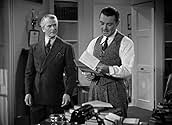IMDb रेटिंग
7.4/10
13 हज़ार
आपकी रेटिंग
अपनी भाषा में प्लॉट जोड़ेंA young socialite is diagnosed with an inoperable brain tumor, and must decide whether or not she'll meet her final days with dignity.A young socialite is diagnosed with an inoperable brain tumor, and must decide whether or not she'll meet her final days with dignity.A young socialite is diagnosed with an inoperable brain tumor, and must decide whether or not she'll meet her final days with dignity.
- निर्देशक
- लेखक
- स्टार
- 3 ऑस्कर के लिए नामांकित
- 5 जीत और कुल 4 नामांकन
Black Ace
- Judith's Horse
- (बिना क्रेडिट के)
Marian Alden
- Judith's Friend
- (बिना क्रेडिट के)
Wilda Bennett
- Judith's Friend
- (बिना क्रेडिट के)
Diane Bernard
- Lucy - a Servant
- (बिना क्रेडिट के)
फ़ीचर्ड समीक्षाएं
"Dark Victory" features a superb performance by Bette Davis, portraying Judy Traherne, a socialite struggling to come to terms with terminal brain cancer, a diagnosis that ironically brings her the greatest joy of her life, as she falls in love with and marries the doctor who diagnosed her, also superbly played by George Brent.
There's nothing really to dislike in this movie. The basic point is simple to figure out: whatever darkness you may face, make the best of it and live life to the fullest, because even in darkness there may be victory. The supporting cast is tremendous, particularly Geraldine Fitzgerald as Ann King, Judy's friend and assistant who helps her through this bewildering time of conflicting emotions. The movie is not exactly filled with suspense and there's no dramatic death scene, but the emotion is raw all the way through, and the sympathy the viewer feels for this couple who are so much in love but have so little time to enjoy it is very real.
This is very well done, and well worth a look see. I would rate it as a 7/10.
There's nothing really to dislike in this movie. The basic point is simple to figure out: whatever darkness you may face, make the best of it and live life to the fullest, because even in darkness there may be victory. The supporting cast is tremendous, particularly Geraldine Fitzgerald as Ann King, Judy's friend and assistant who helps her through this bewildering time of conflicting emotions. The movie is not exactly filled with suspense and there's no dramatic death scene, but the emotion is raw all the way through, and the sympathy the viewer feels for this couple who are so much in love but have so little time to enjoy it is very real.
This is very well done, and well worth a look see. I would rate it as a 7/10.
When Bette Davis was in ball buster mode, watch out!! But when she decided to suffer nobly, she could suffer with the best of them.
In "Dark Victory," Davis plays a woman dying from the deadliest of deadly diseases---the vague, unnamed illness that beautiful actresses died of in movies from the 1930s. The symptoms never seem to be the same, but they're always tear-inducing. Here, they make Davis go blind and we know when the disease is getting worse because a fuzzy black halo begins to appear around the edges of the frame.
Actually, this movie is a rather pale companion to the ultimate Davis melodrama, "Now, Voyager." But it has perhaps my favorite line ever delivered in a Bette Davis movie. She's found out that her illness is fatal, and she's at dinner with the doctor who has kept this from her to protect her fragile soul. When the waiter comes to take her order, she says, "How about a nice big helping of..." pause, as she throws the most withering of withering stares at her companion ..."prognosis negative." That should really be on a bumper sticker somewhere.
As for the other actors.....wait, other actors? No one watches a Bette Davis movie to see other actors. I'm not even sure there were any other actors in this movie.
Grade: B
In "Dark Victory," Davis plays a woman dying from the deadliest of deadly diseases---the vague, unnamed illness that beautiful actresses died of in movies from the 1930s. The symptoms never seem to be the same, but they're always tear-inducing. Here, they make Davis go blind and we know when the disease is getting worse because a fuzzy black halo begins to appear around the edges of the frame.
Actually, this movie is a rather pale companion to the ultimate Davis melodrama, "Now, Voyager." But it has perhaps my favorite line ever delivered in a Bette Davis movie. She's found out that her illness is fatal, and she's at dinner with the doctor who has kept this from her to protect her fragile soul. When the waiter comes to take her order, she says, "How about a nice big helping of..." pause, as she throws the most withering of withering stares at her companion ..."prognosis negative." That should really be on a bumper sticker somewhere.
As for the other actors.....wait, other actors? No one watches a Bette Davis movie to see other actors. I'm not even sure there were any other actors in this movie.
Grade: B
I was probably 12 years old when I first saw this film on TV. It was shown in two parts and I didn't get to see the second part, so my mother had to tell me what happened.
Forty years later, I still cry every time I see "Dark Victory." It remains one of my favorite films for sheer use of Kleenex and my favorite Bette Davis movie, "All About Eve" being right up there with it. I even saw it on the big screen in a revival house when I was in college.
Yes, some of the dialogue sounds corny now, like the good doctor saying, "Women never meant anything to me before". But the interesting thing is, when I did see it with an audience, though they laughed as some inappropriate spots, by the end you could hear the sobs on the next block.
There have been comments that Humphrey Bogart seems miscast in a somewhat minor role. I frankly thought he was just fine. He certainly was short enough to be a jockey and he pulled off the brogue.
I'm sure it's confusing for some to see him in such a small role in 1939 when only a few years later, he was a total superstar. But he was under contract to Warners and kicked around for years before "High Sierra" and "Casablanca".
He obviously wasn't working when "Dark Victory" was cast, so why let him sit around taking a salary and do nothing?
And of course we have Ronald Reagan as a playboy. I actually find him delightful in this film. It called for charm and he had it.
In today's fast-paced world, there's nothing stronger than a message about time and our use of it. "Oh, give me time for tenderness...just give me time."
Like Bette's character, I want to hear that song again too, in many more viewings of "Dark Victory."
Forty years later, I still cry every time I see "Dark Victory." It remains one of my favorite films for sheer use of Kleenex and my favorite Bette Davis movie, "All About Eve" being right up there with it. I even saw it on the big screen in a revival house when I was in college.
Yes, some of the dialogue sounds corny now, like the good doctor saying, "Women never meant anything to me before". But the interesting thing is, when I did see it with an audience, though they laughed as some inappropriate spots, by the end you could hear the sobs on the next block.
There have been comments that Humphrey Bogart seems miscast in a somewhat minor role. I frankly thought he was just fine. He certainly was short enough to be a jockey and he pulled off the brogue.
I'm sure it's confusing for some to see him in such a small role in 1939 when only a few years later, he was a total superstar. But he was under contract to Warners and kicked around for years before "High Sierra" and "Casablanca".
He obviously wasn't working when "Dark Victory" was cast, so why let him sit around taking a salary and do nothing?
And of course we have Ronald Reagan as a playboy. I actually find him delightful in this film. It called for charm and he had it.
In today's fast-paced world, there's nothing stronger than a message about time and our use of it. "Oh, give me time for tenderness...just give me time."
Like Bette's character, I want to hear that song again too, in many more viewings of "Dark Victory."
By today's standards, "Dark Victory" might seem cliched. Of course, that could be because it was so greatly copied! Here is Bette Davis, a star in the fullness of her talent and ability. Bette simply shines; she owns this film from first frame to last. Ably supported by a wonderful cast (including a somewhat mis-matched Humphrey Bogart as an Irish-brogued horse trainer), it is still difficult to watch the film and not be constantly anticipating Bette's appearance in any scene she isn't in. The ending, even in those days, might have turned out either wimpy or waspish. In Bette's hands, it is neither. It works in a way that literally drains one of emotions. I might also add that, while revealing only a bare back, Bette shows more sensuality than a dozen of today's more "open" actresses.
There is an old disparaging adage about "showing the full gamut from a to b," in this movie Bette not only shows A to Z, but some letters that haven't been invented yet.
Despite my gushing over Ms. Davis, the film is solid in all departments. If you wish to experience when melodrama is great movie-making, see this film.
There is an old disparaging adage about "showing the full gamut from a to b," in this movie Bette not only shows A to Z, but some letters that haven't been invented yet.
Despite my gushing over Ms. Davis, the film is solid in all departments. If you wish to experience when melodrama is great movie-making, see this film.
Judith is a wealthy Long Island society girl given to a dizzy lifestyle
Self-assured of her affluence and her faculty over men, she is unprepared for tragedy, which strikes in the form of a brain tumor
The underlying bravery and courage with which she faces this physical suffering eventually demonstrates the woman of substance that she is
Among her friends is Ann King (Fitzgerald), her secretary, and handsome young Alex Hamm (Reagan), who directs her toward brain specialist Dr. Frederick Steele (Brent). The doctor diagnoses her illness as one which will end her life within a year Judith falls in love with him and accepts his proposal of marriage When she discovers that her tumor is calamitous, she rejects the doctor's proposal considering it an act with compassion
Davis provides scene after scene with the special magic only she was able of bringing vividly
Swept into the current of events was Bogart playing an Irish horse trainer, who fails in an attempt to make love to her, yet encourages her to enjoy her time with her true love, George Brent
The film was remade in 1963 as "Stolen Hours" with Susan Hayward, and as a 1976 TV movie under its original title with Elizabeth Montgomery
Among her friends is Ann King (Fitzgerald), her secretary, and handsome young Alex Hamm (Reagan), who directs her toward brain specialist Dr. Frederick Steele (Brent). The doctor diagnoses her illness as one which will end her life within a year Judith falls in love with him and accepts his proposal of marriage When she discovers that her tumor is calamitous, she rejects the doctor's proposal considering it an act with compassion
Davis provides scene after scene with the special magic only she was able of bringing vividly
Swept into the current of events was Bogart playing an Irish horse trainer, who fails in an attempt to make love to her, yet encourages her to enjoy her time with her true love, George Brent
The film was remade in 1963 as "Stolen Hours" with Susan Hayward, and as a 1976 TV movie under its original title with Elizabeth Montgomery
क्या आपको पता है
- ट्रिवियाOff-screen, Bette Davis suffered a nervous breakdown during filming as a result of her crumbling marriage to Harmon Nelson. Reportedly, producer Hal B. Wallis convinced Davis that she could benefit by using these real-life emotions of pain and loss to enhance the portrayal of her character. Meanwhile, Davis's marital problems didn't prevent her from embarking on an affair with co-star George Brent. Davis and Brent appeared in a total of 11 movies together.
- गूफ़When the setting changes to Vermont towards the end of the film, there is snow on the ground and it is obviously winter. Yet most of the trees in front of the house still have leaves on them.
- इसके अलावा अन्य वर्जनAlso available in computer-coloured version.
- कनेक्शनFeatured in Stars on Horseback (1943)
- साउंडट्रैकOH, GIVE ME TIME FOR TENDERNESS
(1939) (uncredited)
Music by Edmund Goulding
Lyrics by Elsie Janis
Sung by Vera Van
टॉप पसंद
रेटिंग देने के लिए साइन-इन करें और वैयक्तिकृत सुझावों के लिए वॉचलिस्ट करें
विवरण
बॉक्स ऑफ़िस
- दुनिया भर में सकल
- $345
- चलने की अवधि
- 1 घं 44 मि(104 min)
- रंग
- ध्वनि मिश्रण
- पक्ष अनुपात
- 1.37 : 1
इस पेज में योगदान दें
किसी बदलाव का सुझाव दें या अनुपलब्ध कॉन्टेंट जोड़ें


